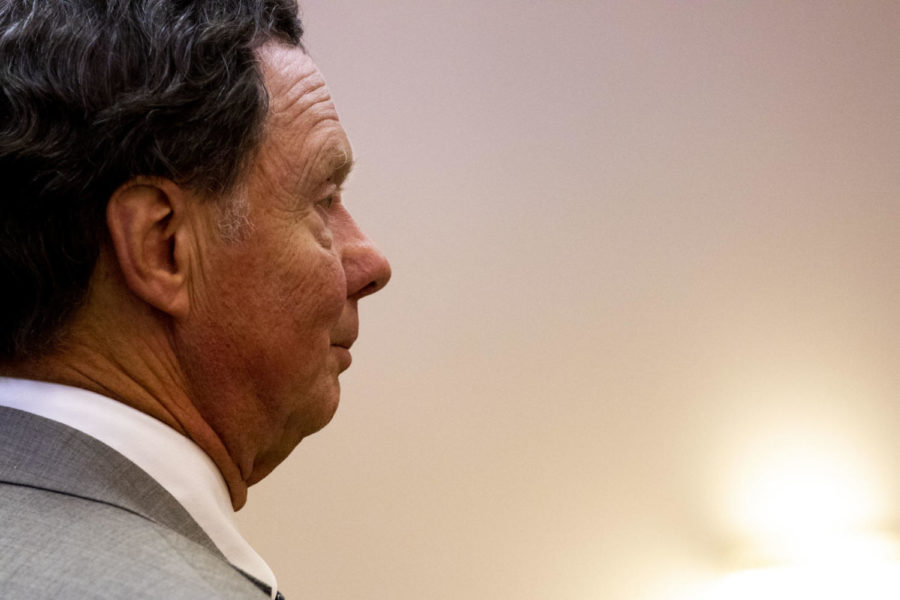Oral arguments heard in Kernel v. UK appeal; decision from panel still to come
September 25, 2018
Attorneys representing UK, the Kernel and the Kentucky Attorney General’s office argued their positions before a panel of three judges in the Kentucky Court of Appeals on Tuesday.
Since the Kernel’s law team is appealing an earlier decision, Kernel lawyer Tom Miller had to prove to the panel that the previous decision was incorrect. UK’s lawyers needed only to defend the earlier decision.
The decision in question came in January 2017, when a Fayette County judge ruled in favor of UK in its lawsuit against the Kernel. The hearing is the latest development in a long saga of court battles over open records disputes between the Kernel and several Kentucky public universities.
It’s not clear when a decision will be made, but presiding judge Robert Johnson said during the proceedings that the court would make an announcement “in the next 45 to 60 days.”
Fifteen minutes of speaking time was allotted to both Miller and Travis Mayo, an assistant attorney general. Josh Salsburey, who represented UK’s legal counsel, was allowed 30 minutes to defend the previous court’s decision. Then Miller and Mayo were each allowed three-minute rebuttals.
The three judges who sat on the panel were allowed to interrupt the attorneys at any point during their arguments to ask questions.
The case began in August 2016 when UK opted to sue the Kernel after the university refused to give the Kernel investigative documents pertaining to James Harwood, a UK professor accused of sexual misconduct. The Kernel requested the documents under the Kentucky Open Records Act, but UK argued that releasing the documents— even with personal identifiers removed from the files— would cause the university to violate the Federal Educational Rights and Privacy Act, a federal student privacy act better known as FERPA.
The Fayette County judge agreed with UK’s assessment in 2017, and UK continued to assert the same argument before the appeals court.
After the oral arguments, UK’s lawyer declined to comment but directed any questions to UK spokesperson Jay Blanton, who was not present at the oral arguments.
“We are pleased that the Court focused on the legal rights of victim-survivors to make the decision about when— or even if— to tell their story. This case has always been about their privacy and their rights,” Blanton wrote in a statement after the oral arguments.
The Kernel’s law team and the attorney general’s office have argued that UK is citing a federal statute in order to avoid releasing information that may be damaging to the university’s reputation. Both attorneys continued those arguments before the appeals court.
“I strongly believe that all of the case authority and all of the factual support is persuasive and it did seem that the judges fully understood that,” Miller told the Kernel after the oral arguments. “I’m optimistic about a favorable ruling.”
Mayo spoke first and on behalf of the attorney general’s office argued that UK’s interpretation of the law and behavior in this case is a threat to the Kentucky Open Records Act and government transparency.
He said that under the Kentucky Open Records Act, the state’s attorney general is allowed to review denied open records requests and determine if the denial was appropriate. UK never allowed the attorney general’s office to review the documents in question, which Mayo argued is in violation of the statute.
“The university asks this court, and every court of the commonwealth to allow it and all public agencies the unlimited and unqualified authority to withhold records from the public without proving that the law allows them— shutting the open doors to government that the open records act mandates,” Mayo told the panel.
Miller argued on behalf of the Kernel’s law team that the documents in question are not student-specific documents that would be protected under FERPA, but rather are investigative pieces that detail the sexual advances and harassment allegedly perpetrated by a UK professor— information that, Miller argued, ought to be allowed to be requested from government agencies and publicized to protect possible future victims.
“Larry Nassar, Jerry Sandusky, James Harwood. What do these men have in common?” Miller said before the court. “They were all university employees who used their power to abuse women and children who were under their control. Another commonality is that in all three cases the universities tried to avoid disclosure of an embarrassing fact but finally did after news media outed them.”
Salsburey said on behalf of UK that releasing the documents, even with redactions, would violate federal law and cause students and especially student-victims to lose trust in the university. He argued that the contents of the investigative documents may allow “skillful googlers” to identify the victims, even if their names or other identifying information were removed.
Salsburey told the court that siding with the Kernel and the Attorney General would among other things, “send the untenable message that the university cannot protect student-victim privacy.”
The panel will need to come to a majority decision on whether to affirm or reverse the Fayette Circuit Court decision.
Jacob Eads and Sydney Momeyer contributed to the reporting for this story.
































































































































































